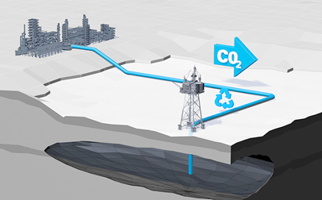
The Oil and Gas Authority (OGA) has today published its Annual Report and Accounts which gives an overview of performance over the past year and expectations for the coming years.
The report reveals that OGA interventions in 2021 have helped the oil and gas industry avoid producing 970,000 tonnes of future carbon dioxide equivalent – the same as taking 500,000 cars off the road for a year.
The OGA’s work follows the revision of its Strategy, which saw the introduction of a new obligation on industry to support the UK’s net zero target, and has been followed by new emissions benchmarking and monitoring to hold industry to account.
Other highlights of the year include:
- CO2 emissions from offshore installations and terminals have fallen 10% between 2019 and 2020
- Flaring volumes decreased 22% in 2020 – equivalent to the gas demand of 200,000 homes
- Production efficiency has remained at 80% for a second consecutive year, while operating costs have fallen to £11.10 per barrel
The report quotes official figures that oil and gas still make up around three-quarters of the UK’s energy consumption and it is needed for heating, transport, power generation and the manufacture of vital products such as medicines and chemicals, but also stresses that the industry must play its part in the transition to net zero through its expertise, infrastructure and capital.
Tim Eggar, OGA Chairman, stressed the requirement for investment in platform electrification and carbon storage alongside the need for clean blue and green hydrogen and floating wind, which together can absorb 60% of the UK’s 2050 reductions.
He said:
“Actions are needed now. Targets are all very well but delivering on them – or better still – exceeding them is the real challenge. Real-life, tangible, working projects are urgently needed to demonstrate leadership and provide evidence that industry is part of the climate change solution and not the problem. I am confident that the industry will deliver on its commitments.”
Andy Samuel, OGA Chief Executive, welcomed the North Sea Transition Deal and its commitment to ‘funding exciting energy transition projects including electrification, carbon capture and storage, the global underwater hub, the energy transition zone and hydrogen projects’.
On the OGA’s priorities, he said:
“Looking ahead, we’ll continue our net zero programme and Strategy, including updating associated guidance and introducing a new Supply Chain Stewardship Expectation. We’ll continue working closely with industry and government to make sure the North Sea Transition Deal delivers what it set out to.
“With all the net zero work ongoing, we are also keeping a sharp focus on resource progression; there are a number of valuable field development projects in the pipeline. We also look forward to seeing new field developments being electrified and we’re actively supporting electrification projects in their early stages in the Central North Sea and West of Shetland'.


